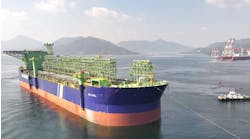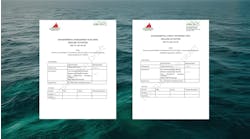Offshore staff
RIO DE JANEIRO – Petrobras has completed an extended well test (EWT) on the Mero field in the Libra block in the presalt Santos basin.
This had started last November from theFPSOPioneiro de Libra, which was the company’s first EWT-dedicated program equipped to inject the gas produced.
During the tests, the production well delivered 58,000 boe/d, which the company described as “a great result in ultra-deepwaters.”
The other aims, all achieved, were to obtain high-quality data and reduce uncertainties over the reservoir, to allow accelerated deployment of up to four full-scale production systems on Libra in the next few years, each capable of producing up to 180,000 b/d of oil.
In addition, the tests should contribute to the safe and efficient development of upcoming projects throughout the global ultra-deepwater oil and gas industry, Petrobras claimed.
The FPSOPioneiro de Libra will remain in service conducting early production systems at other Mero wells.
The next step will be to replace the current gas injector well with another positioned closer to the producer well. The vessel’s moorings will then be unanchored allowing it to mobilize to a new location on the Mero field.
ThePioneiro de Libra is designed to process up to 50,000 b/d of oil and 4 MMcm/d of associated gas.
According to Petrobras, the Libra area features reservoirs that are among Brazil’s most productive, with oil columns up to 400 m (1,312 ft) thick.
However, the high flow rates and pressures, a high gas-oil content and carbon dioxide have all necessitated implementation of latest-generation solutions to facilitate production.
Petrobras and its partners have responded by developing new technologies to operate in these environments, where water depths range from 1,700-2,400 m (5,577-7,874 ft), with subsurface depths of up to 6,000 m (19,685 ft).
The FPSO’s gas re-injection capability eliminates continuous flaring of gas, helping to minimize carbon dioxide to the atmosphere while allowing wells to produce at their maximum potential.
In addition, being able to produce during the EWT without restrictions helped optimize the acquisition of dynamic data from the reservoir.
This arrangement also involved the first pre-launch of flexible lines with floats in ultra-deepwaters in advance of a production start 43 days later.
Use of 8-in. flexible risers in a lazy wave configuration allowed high-volume production in this water depth. Due to the loads imposed on the lines, the FPSO has an external turret anchoring providing the strongest support of a vertical load in offshore sector’s history, Petrobras claimed, with a capacity of 700 tons for each of the nine risers in water depth of up to 2,400 m (7,874 ft).
The turret mooring system incorporated a robust swivel, which allows the vessel to rotate in relation to the turret. According to Petrobras, it supports the largest operating and design pressures – respectively 550 bar and 605 bar (7,977 psi and 10,080 psi) – for gas injection anywhere in the oil industry.
Petrobras’ partners are Shell, Total, CNPC and CNOOC, with state-owned Pré-Sal Petróleo – PPSA serving as contract manager.
10/08/2018


